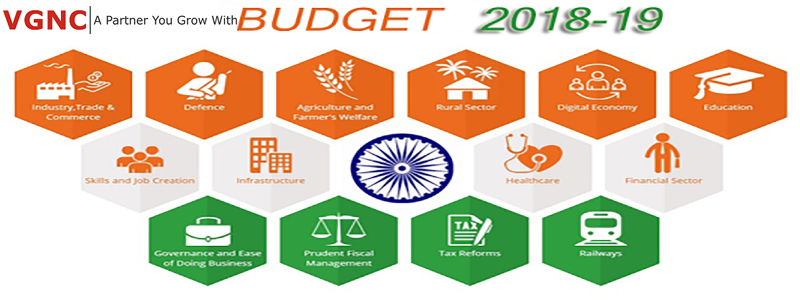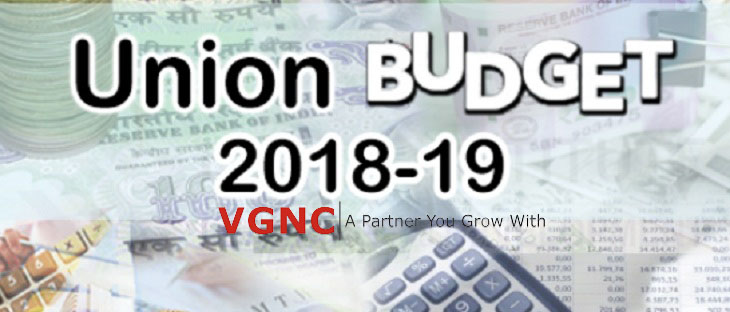Amidst the usual speculation of budgetary reforms, the expectation of common people and the world at large looking forward to the budget of one of the fastest growing economy, the finance minister presented the Union Budget 2018. Abstaining from all the temptation to make union budget a mirror of recent USA tax reforms, the Finance Minister presented a budget that was more focused on promoting the aspirations of New and Growing India and consolidate gains.
“The highlight of Union Budget 2018 being the rural economy, agriculture, healthcare, infrastructure and MSMEs was not a surprise at all. It was evident that the finance minister will aim for bullseye by laying a robust foundation for growing economy to stand on and push the economy ahead.” – Vipin Garg
The budget brings transformational changes to all the crucial sectors while taking additional measures for ensuring consistent growth. Alternative investment and outbound direct investment are slightly touched in this budget.
With the Union Budget 2018, the Government’s intention to seek development through reliance on technological advancement has continued. The emphasis has been placed on the use of technology for various sectors, including education sector with the theme of – blackboard to digital board.
The blockchain technology has been acknowledged which is a necessary element of the digital economy. Mandatory e-audits by tax authorities is a step forward to digitisation of the economy and Government processes.

Budget Highlights
Direct Taxes
Personal tax
- No change in tax slabs or tax rates for individual taxpayers.
- Health and Education Cess at the rate of 4% of tax and surcharge to take place of Education Cess and Secondary and Higher Education Cess
- Standard deduction provided from salary income in lieu of reimbursement of medical expenses and transport allowance to be up to INR 40,000
- Increased sops for senior citizens
Company Tax
Business Income Snippets
- Rate of income-tax to be 25% for domestic company if the total turnover or gross receipts of the FY 2016-17 does not exceed INR 2.5bn
- Introduction of retrospective amendments to regularise the compliance with the notified ICDS
- Deemed dividends u/s 2(22)(e) of the Act, on account of advancing loans and advances to be subject to Dividend Distribution Tax at 30%
- Benefit allowed to a new employee who is employed for less than 240 days during the first year but continues to remain employed for 240 days in the subsequent year.
- Minimum employment period of 150 days extended to footwear and leather industry
- Rationalisation of provisions for companies seeking resolution under IBC, 2016, including relief under MAT, relaxation from rigours of section 79 of the Act, etc.
- The exemption on LTCG on listed securities to be withdrawn, subject to grandfathering
- In respect of section 50C and section 56 of the Act, no adjustment to be made in case variation between stamp duty value and the sale consideration is not more than 5% of the sale consideration

Foreign Company
Corporate tax rates remain unchanged at 40% (plus applicable surcharge and cess). It has been proposed to replace Education cess of 3% by Health & Education cess of 4%. Effective tax rates shall be as under.
Domestic Company
Corporate tax rate reduced to 25% (plus applicable surcharge and cess) for domestic companies having total turnover/ gross receipts not exceeding INR 2.5bn in the FY 2016-17. In other cases, the tax rates remain unchanged at 30% (plus applicable surcharge and cess). It has been proposed to replace Education cess of 3% by Health & Education cess of 4%. Effective tax rates are as under.
Partnership Firm/ LLP
Tax rates remain unchanged except for “Health and Education cess”. Effective tax rate of 31.2% if taxable income is less than INR 10 million and 34.94% if taxable income exceeds INR 10 million.
Individuals/ HUF/ BOI
Tax rates remain unchanged except for effective increase in the rate of cess by 1% as “Health and Education cess”.
MAT/ AMT
Tax rates of both MAT and AMT remain unchanged at 18.5% (plus applicable surcharge) except for effective increase in the rate of cess by 1% as “Health and Education cess”.
Tax on Dividends
Rate of DDT remains unchanged at 15% (plus applicable surcharge of 12%) except for effective increase in the rate of cess by 1% as “Health and Education cess”.
Further, scope of DDT expanded to include deemed dividend under section 2(22)(e) and the rate prescribed thereto is 30% (plus applicable surcharge and cess).

Non-resident taxation
- Dependent agent to include habitual conclusion of contracts and principal role played in conclusion of contracts
- Significant economic presence – business models which do not require physical presence
- MAT provisions not to apply to foreign companies opting for presumptive taxation regime
Others
- Plan to be chalked to roll out e-assessment nationwide to impart greater transparency and accountability
- Penal and prosecution provisions made stringent for failure to furnish tax returns /statement of financial transactions
- Time-lines for furnishing CbCR extended to 12 months from the end of reporting accounting year
- Return to be filed within timelines for claiming deductions for computing total income
Indirect Taxes
- Amendments made in Customs Act, 1962 from the perspective of ease of doing business and trade facilitation like revised guidelines for Advance Rulings, electronic ledger, customs automated system for clearances and dispute resolution
- Rates of Basic Customs Duty increased for various goods such as radial tyres; buses, cars, truck and motorcycles in CKD condition; mobile phones; and smart watches
- Rates of Basic Customs Duty decreased for few goods such as inputs or parts for manufacture of PCBA/ moulded plastics of charger/ adapter of cellular mobile phones
- Education Cess and Secondary and Higher Education Cess replaced with Social Welfare Surcharge to be levied on aggregate of duties of Customs except IGST and GST
- Compensation cess in addition to other duties
- Amendments made in the taxation structure of petrol and high speed diesel by introducing
- Road and Infrastructure Cess without any change in effective rate of duty

Transfer Pricing
As part of the implementation of the BEPS Action Plan 13 regarding Three Tier TP Documentation, India had introduced Country by Country Report (CbCR) requirements effective from AY 2017-18. This required certain Indian headquartered MNEs, and in some cases Indian affiliates of foreign headquartered MNEs, to file CbCR in India reporting countrywise details of revenue, profits, taxes, number of employees, etc. It is proposed to amend these provisions to align with OECD’s recommendations as follows:
- The time limit for furnishing the CbCR shall be 12 months from the end of the reporting accounting year, as compared to the earlier time limit of return filing date; and
- CbCR shall also be required to be filed in India by Indian affiliates of foreign headquartered MNEs, if there is no obligation to file CbCR in the home jurisdiction and the parent has not designated any Alternate Reporting Entity outside India.
- The above amendments are clarificatory in nature and are applicable from AY 2017-18.
Customs Duty
Being the first budget after the implementation of GST, the changes were primarily limited to customs only. While there was no change in the merit rate of basic customs duty, to further encourage “Make in India,” basic customs duty on specified goods of food processing, electronics, auto sector, etc. was increased. Apart from that, the focus was to align the customs law to ensure ease of doing business and meeting the commitments of the Trade Facilitation Agreement.
Rate of duty
-
- Median rate of basic customs duty retained at 10%
Changes in Customs Act, 1962
-
-
- Scope of the Customs Act, 1962 expanded to cover any offence or contravention committed outside India by any person.
- “Assessment” to now include specific aspects such as classification, duty, valuation, exemption or concession of duty etc..
- “Indian customs waters” expanded to exclusive economic zones.
- Expansion in scope of provisional assessment to include exports as well.
- Process of pre-notice consultation by the authorities before issuance of demand notice for recovery of duty or refund in cases other than collusion, suppression, etc.
- Supplementary show cause notice to be issued in specified cases and subject to conditions.
- Definite time frame provided for adjudication of demand notices including their extension. In the event the demand notice is not adjudicated within the specified time period including extension, it would be deemed that no notice was issued.
- In cases where the extended period due to collusion, suppression of facts, etc. is set aside by the appellate authority, the demand pertaining to normal period of 2 years will sustain and a proceeding will be undertaken on that basis.
- Expansion of the term “applicant” to include any import or exporter, or any other person with justiciable cause to the satisfaction of the authority.
- Empowering the Central Government to include any matter on which Advance Ruling can be sought.
- Reducing time limit for pronouncement of ruling from 6 months to 3 months.
- Permitting appeal to the appellate authority against ruling by the applicant or the customs authorities.
- Facility of electronic ledger for payment of duty, interest, penalty, fee, etc., automated system-based clearance and audit notified.
- The requirement to pay redemption fine dispensed with in cases of voluntary payment of all dues. Further, the option to pay redemption fine to be void, if not paid within 120 days from the date such option was extended.
- Commissioner Appeals empowered to remand cases to original adjudicating authority in specific cases or circumstances.
- Central Government to enter into an agreement or arrangement for exchange of information with any country for facilitation of trade and enforcement of the Customs Act, 1962.
- Valuation methodology for computation of IGST and Compensation Cess for warehoused goods sold prior to clearance for home consumption or export prescribed.
-
Central Excise
Amendments have been made in the taxation structure of petrol (motor spirit) and high-speed diesel but the effective rate of duty on these products will remain unchanged.
Excise duty on petrol and diesel (effective from 02 February 2018)
-
-
- Road and Infrastructure Cess at INR 8 per litre to be levied on petrol and high-speed diesel.
- Abolishment of additional excise duty of INR 6 per litre previously levied on petrol (vide Finance (No. 2) Act, 1998) and high-speed diesel (vide Finance Act, 1999).
- Petrol and high-speed diesel basic excise duty to be reduced by INR 2 per litre.
- No change in Special Additional Excise Duty.
-
The net impact of duty on petrol and high-speed diesel will remain unchanged.
Other exemptions (effective from 02 February 2018)
In line with the excise duty exemptions accorded previously, the following exemptions are also harmonised:
-
-
- Road and Infrastructure cess levied for the following products are exempt subject to payment of appropriate excise duties on petrol and diesel and GST on ethanol or bio-diesel used for making such blends.
- 5% ethanol blended petrol.
- 10% ethanol blended petrol.
- Bio-diesel, up to 20% volume.
- 5 percent exemption from excise duty (i.e. Basic Excise Duty, Road and Infrastructure Cess and Special Additional Excise Duty) on petrol and diesel manufactured and cleared from four oil refineries in north-east India.
- Road and Infrastructure cess levied for the following products are exempt subject to payment of appropriate excise duties on petrol and diesel and GST on ethanol or bio-diesel used for making such blends.
-
Service Tax
The retrospective exemption has been accorded to certain services from the levy of service tax.
-
-
-
-
- Life insurance services provided by the Naval Group Insurance Fund to personnel of coast guard under the Group Insurance Schemes of the Central Government exempt from 10 September 2004.
- Services provided by the GST Network to the Central or State Governments or the Union Territory administration exempt from 28 March 2013.
- Grant of license or lease for exploration of petroleum crude or natural gas by the Government for which the Government receives a share of the profit petroleum exempt from 01 April 2016.
-
-
-
Refund can be claimed within 6 months from enactment of the Finance Bill, 2018.
In conclusion, it is evident that the Union Budget 2018 is building a strong foundation of New India. By placing reliance on technological advancement, the Finance Minister has supported the growth-oriented vision of the Prime Minister of the fastest growing economy.

Telephone No.09810666554
